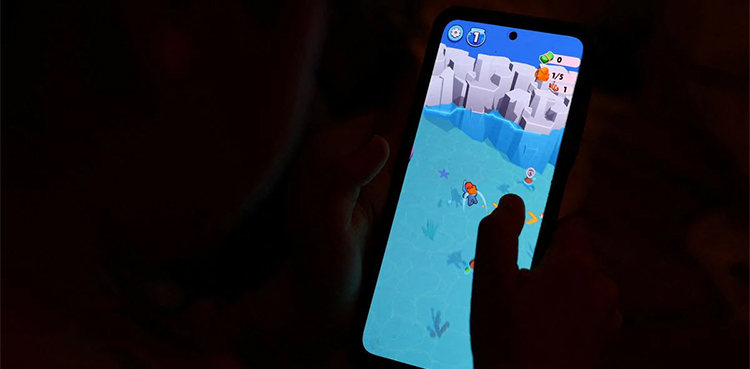
Pro-Israel ads make their way into children’s video games

Maria Julia Cassis was sitting down to a meal in her terraced home in north London when her 6-year-old son ran into the dining room, his face pale. The puzzle game on his Android phone had been interrupted by a video showing Hamas militants, terrified Israeli families and blurred graphic footage. Over a black screen, a message from the Israeli Ministry of Foreign Affairs told the first grader: “WE WILL MAKE SURE THAT THOSE WHO HARM US PAY A HEAVY PRICE.”
Cassis, a 28-year-old barista from Brazil, said that the ad left her son shaken and she quickly deleted the game.
“He was shocked,” she said in a telephone interview last week. “He literally said, ‘What is this bloody ad doing in my game?'”
Reuters has not been able to establish how the ad came to her son’s video game, but her family isn’t alone. The news agency has documented at least five other cases across Europe where the same pro-Israel video, which carried footage of rocket attacks, a fiery explosion, and masked gunmen, was shown to gamers, including several children.
In at least one case, the ads were played inside the popular “Angry Birds” game made by SEGA-owned developer Rovio.
Rovio confirmed that “somehow these ads with disturbing content have in error made it through to our game” and were now being blocked manually. Spokesperson Lotta Backlund did not provide details on which of its “dozen or so ad partners” had supplied it with the ad.
Israeli Ministry of Foreign Affairs’ head of digital, David Saranga, confirmed that the video was a government-promoted ad but said he had “no idea” how it ended up inside various games.
He said the footage was part of a larger advocacy drive by the Israeli Foreign Ministry, which has spent $1.5 million on internet ads since Hamas’ Oct. 7 attack on civilians in southern Israel ignited war in Gaza. He said officials had specifically instructed advertisers “to block it for people under 18”.
Saranga defended the graphic nature of the ad campaign.
“We want the world to understand that what happened here in Israel,” he said. “It’s a massacre.”
Reuters contacted 43 advertising firms that Rovio listed on its website as “third-party data partners” to try to ascertain who placed the ad in the games.
Of those partners, 12 responded, including Amazon, Index Exchange and Pinterest, and said they were not responsible for the ad appearing on Angry Birds.
Saranga said the ministry had spent money with ad companies including Taboola (TBLA.O), Outbrain, Google and X, formerly known as Twitter. Taboola and Outbrain said they had nothing to do with the gaming ads.
Google ran more than 90 ads for the foreign ministry but declined to comment on where it displayed those ads. X, formerly known as Twitter, didn’t respond to requests for comment.
Reuters found no evidence of an analogous Palestinian digital advertising effort, save for a few Arabic-language videos promoted by West Bank-based Palestine TV, a news agency affiliated with the Palestinian Authority.
A representative from the Palestinian Authority’s foreign ministry shared a statement saying the ministry was working to sway public opinion by sharing evidence of suffering in Gaza under the Israeli bombardment that followed the Oct. 7 attack, but did not say whether it was using advertising as a tool.
Representatives from Hamas, the Islamist movement that governs Gaza, did not respond to Reuters requests for comment about its media campaigns.
Reuters documented six cases – in Britain, France, Austria, Germany and Holland – where people had seen the same or similar ads as Cassis’ son or said their children had seen them. In the Cassis family’s case, the ads appeared in a game called “Alice’s Mergeland” made by a developer called LazyDog Game. Other ads appeared on family-friendly digital pastimes such as the block-building game “Stack,” puzzle game “Balls’n Ropes,” “Solitaire: Card Game 2023,” and run-and-jump adventure “Subway Surfers.”
Alexandra Marginean, a 24-year-old intern living in Munich said she was surprised to see the pro-Israel video pop up in the middle of her game of Solitaire.
“I had a very aggressive reaction to it,” Marginean said.
LazyDog Game did not respond to requests for comment. Stack’s Ubisoft-owned developer Ketchapp, Solitaire’s Austrian developer nerByte, Balls’n Ropes’ Turkish developer Rollic and Subway Surfers’ Danish developer SYBO Games also did not return messages seeking comment on the ads.
Apple and Google, which police the apps on their in-house software platforms for iPhones and Android phones, respectively, referred questions back to the games’ developers.
Rules on advertisements vary by country, but in Britain – where Cassis and her son live – it’s the Advertising Standards Authority that monitors publicity campaigns. The authority said that while it was not currently investigating any ads from the Israeli government, in general any publicity with graphic imagery should be “carefully targeted away from under-18s.”
from Science and Technology News - Latest science and technology news https://ift.tt/M1460v8



0 Response to "Pro-Israel ads make their way into children’s video games"
Post a Comment